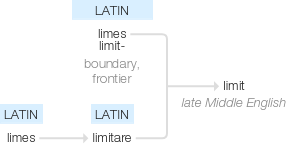Limit
late Middle English: from Latin limes, limit- ‘boundary, frontier’. The verb is from Latin limitare, from limes .
wiktionary
From Middle English limit, from Old French limit, from Latin līmes(“a cross-path or balk between fields, hence a boundary, boundary line or wall, any path or road, border, limit”).
From Middle English limiten, from Old French limiter, from Latin līmitō(“to bound, limit, fix, determine”), from līmes; see noun.
etymonline
limit (n.)
c. 1400, "boundary, frontier," from Old French limite "a boundary," from Latin limitem (nominative limes) "a boundary, limit, border, embankment between fields," which is probably related to limen "threshold," and possibly from the base of limus "transverse, oblique," which is of uncertain origin. Originally of territory; general sense from early 15c. Colloquial sense of "the very extreme, the greatest degree imaginable" is from 1904.
limit (v.)
late 14c., "set limits to, restrict within limits" (also "prescribe, fix, assign"), from Old French limiter "mark (a boundary), restrict; specify" (14c.), from Latin limitare "to bound, limit, fix," from limes "boundary, limit" (see limit (n.)). From early 15c. as "delimit, appoint or specify a limit." Related: limited; limiting; limitable.
